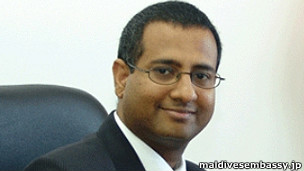Azerbaijan, Baku, Sept. 22 /Trend/
Working as the UN's first special rapporteur on human rights to Iran since 2002 is a very challenging task, UN Special Rapporteur on human rights to Iran Ahmad Shaheed said, RFE/RL reported.
"As a human rights defender, if you look at Iran's situation, you have to do what you can to make some progress there," Shaheed said. "Of course I have many, many, many worries about the road ahead. It's a very challenging task. If you look at Iran's history, in terms of cooperation with the [Human Rights] Council, it's not very promising."
Shaheed has never been to Iran and has no illusions that his new task will be easy.
"My first order of business is gaining access to Iran," he said.
The rapporteur has written a preliminary report to be presented during the General Assembly, and will prepare a full report on the human rights situation by March. At that point the Human Rights Council will decide whether to extend his mandate past eight months.
Iran has not had a special rapporteur on human rights since 2002, when the Human Rights Council decided the government was being transparent enough to ensure that the mandate was no longer necessary.
On June 17, the UN Council on Human Rights appointed former Maldivian Foreign Minister Ahmed Shaheed to the position of UN Special Rapporteur on human rights to Iran.
A resolution to appoint a special rapporteur was adopted at the 16th session of the UN Human Rights Council in Geneva on March 24.
About 22 representatives of 47 Council members voted for the resolution: 7 - against, 14 abstained. Among the abstaining states were Russia, Pakistan and China. The members of the Human Rights Council called on Tehran to fully cooperate with the Special Rapporteur and to allow him entrance into the country.
In response, the Iranian delegation strongly rejected the appointment, accusing a number of member-states of using the UN Human Rights Council for political purposes against Iran.
Late June, Iran's Foreign Minister Ali Akbar Salehi said that Iran does not allow the UN special reporter on human right issues to arrive in Iran as appointment of the UN Human Rights Envoy for Iran is unacceptable.
Then, the Head of Iran's judiciary system Sadiq Larijani said that cooperation between Iran and the UN is used against Iran.
As soon as Shaheed began the eight-month appointment on August 1, he appealed to the Iranian government to extend its full co-operation with his mandate as required by the UN Human Rights Council.
The Human Rights Council founded in 2006 as part of the United Nations replaces the Commission on Human Rights. The council members are UN members, elected by the General Assembly.
The Human Rights Council may establish and abolish the so-called special procedures of rapporteurs, experts, and working groups which focus on specific human rights issues, (for example the Special Rapporteur on torture and the Special Rapporteur on extrajudicial executions), or Human Rights in a certain area (for 2010 - Burundi, Cambodia, North Korea, Haiti, Myanmar, Palestinian Territories, Somalia and Sudan).
Special rapporteurs are appointed by the UN Secretary-General. After receiving their mandate, the rapporteurs act independently of the state.
Edited by T.Konyayeva.






